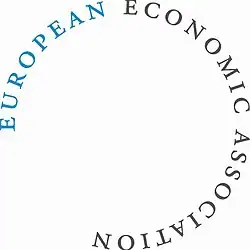European Economic Association
 | |
| Formation | 1986 |
|---|---|
| Legal status | Learned society in economics |
| Purpose | Contribute to the development and application of economics as a science in Europe[2] |
| Headquarters | Tessenderlo, Belgium |
Region served | Europe |
| Members | 4,200[1] |
President | Hélène Rey |
Main organ | Executive Committee[3] |
| Website | www |
The European Economic Association (EEA) is a professional academic body which links European economists. It was founded in the mid-1980s. Its first annual congress was in 1986 in Vienna and its first president was Jacques Drèze.[4] The current president is Hélène Rey.[5] The Association currently has around 4000 members. Its objectives are:
". . . to contribute to the development and application of economics as a science in Europe; to improve communication and exchange between teachers, researchers and students in economics in the different European countries; and to develop and sponsor co-operation between teaching institutions of university level and research institutions in Europe "[6]
It publishes the Journal of the European Economic Association.[7][8] In August of each year the Association, in collaboration with the Econometric Society organises a congress in a European city.[9][10] The congress attracts around 1500 participants.
Association presidents
| Term of Office | Name of President | Country |
|---|---|---|
| 1986 | Jacques Drèze (1929–2022) | |
| 1987 | János Kornai (1928–2021) | |
| 1988 | Edmond Malinvaud (1923–2015) | |
| 1989 | Tony Atkinson (1944–2017) | |
| 1990 | Agnar Sandmo (1938–2019) | |
| 1991 | Assar Lindbeck (1930–2020) | |
| 1992 | Martin Hellwig (born 1949) | |
| 1993 | Mervyn King (born 1948) | |
| 1994 | Roger Guesnerie (born 1943) | |
| 1995 | Louis Phlips (born 1933) | |
| 1996 | David Newbery (born 1943) | |
| 1997 | Reinhard Selten (1930–2016) | |
| 1998 | Jean-Jacques Laffont (1947–2004) | |
| 1999 | Partha Dasgupta (born 1942) | |
| 2000 | James Mirrlees (1936–2018) | |
| 2001 | Jean Tirole (born 1953) | |
| 2002 | J. Peter Neary (1950–2021) | |
| 2003 | Torsten Persson (born 1954) | |
| 2004 | Richard Blundell (born 1952) | |
| 2005 | Mathias Dewatripont (born 1959) | |
| 2006 | Andreu Mas-Colell (born 1944) | |
| 2007 | Guido Tabellini (born 1956) | |
| 2008 | Ernst Fehr (born 1956) | |
| 2009 | Nicholas Stern (born 1946) | |
| 2010 | Tim Besley (born 1960) | |
| 2011 | Christopher Pissarides (born 1948) | |
| 2012 | Jordi Galí (born 1961) | |
| 2013 | Manuel Arellano (born 1957) | |
| 2014 | Orazio Attanasio (born 1959) | |
| 2015 | Rachel Griffith (born 1963) | |
| 2016 | Fabrizio Zilibotti (born 1964) | |
| 2017 | Philippe Aghion (born 1956) | |
| 2018 | Eliana La Ferrara (born 1968) | |
| 2019 | Kjetil Storesletten (born 1967) | |
| 2020 | Per Krusell (born 1959) | |
| 2021 | Silvana Tenreyro (born 1973) | |
| 2022 | Oriana Bandiera (born 1971) | |
| 2023 | Maristella Botticini (born ----) | |
| 2024 | Jan Eeckhout (born 1970) | |
| 2025 | Hélène Rey (born 1970) | |
| 2026 | Imran Rasul (born 1974) President-elect |
References
- ^ "EEA History". Retrieved 2021-01-15.
- ^ "Code of Professional Conduct". Retrieved 2021-01-15.
- ^ "EEA Officers". Retrieved 2021-01-15.
- ^ History of the EEA. Accessed 15. October 2018
- ^ "Executive Committee | EEA". eeassoc.org. Retrieved 2021-01-07.
- ^ Aims of the EEA. Accessed 15. October 2018
- ^ Wiley Online Library. Accessed 15. October 2018
- ^ Journal information on the EEA webpage. Accessed 15. October 2018
- ^ "CESifo News. Accessed 15. October 2018". Archived from the original on 2018-10-16. Retrieved 2018-10-15.
- ^ Webpage of the 33rd Annual Congress of the European Economic Association. Accessed 15. October 2018
- ^ "Past Presidents". European Economic Association. Retrieved 27 March 2025.